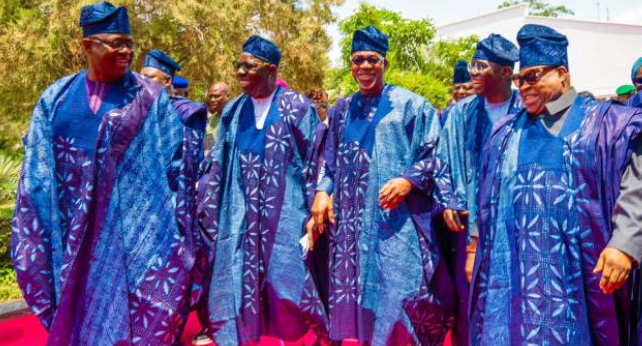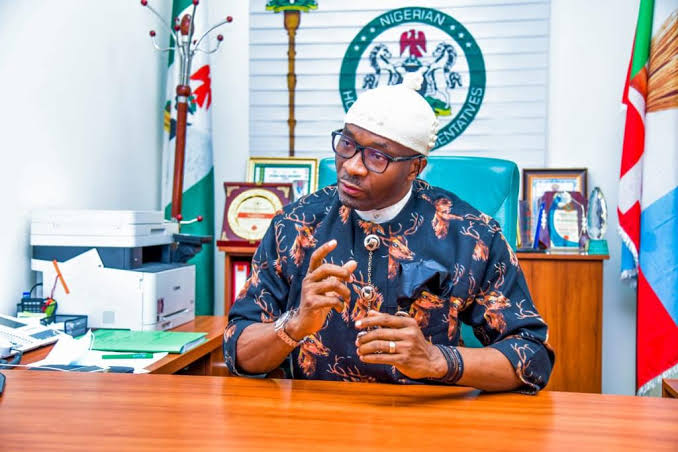News
Allow Each State To Negotiate Minimum Wage — Southern Govs

By Kayode Sanni-Arewa
The 17 Governors from the Southern part of Nigeria under the aegis of the Southern Governors’ Forum have advocated that each state be allowed to negotiate a new minimum wage they can pay with the labour unions.
This was contained in a communique issued at the end of their meeting held in Abeokuta, the Ogun State capital.
“The Forum discussed the minimum wage issues demanded by labour and unanimously agreed that the minimum wage should be reflective of the cost of living and ability to pay, and each State be allowed to negotiate their minimum wage,” the communique partly read.
In the 16 points communique, the Forum called for strengthening of fiscal federalism and devolution of powers and expressed concern over current practices where mineral licenses are issued and explorations undertaken without recourse to state governments
It noted that issuing mineral licenses without carrying the states along have resulted in criminal activities, attendant negative environmental impact, ecological degradation, and with no remediation commitment or revenue accruing to the States or the Federal Government.
The governors maintained that being the economic and industrial region of the country, there was need to address the inadequate power supply in the region by taking advantage of the recent constitutional amendment that now allows States to regulate, generate, transmit and distribute electricity whilst also considering optional sources like renewables.
The southern governors said they have resolved to aggressively embark on energy transition plan from fossil fuels (petrol and diesel) to cleaner energy and specifically CNG (Compressed Natural Gas) and ultimately EV’s (Electric Vehicles) to help reduce the cost of transportation, which would lower the cost of food, goods and services of the citizens and residents.
The meeting also called on the Federal Government to rehabilitate, repair and reconstruct Trunk A roads and transfer some roads to States that have expressed interest in taking them over, applauding President Tinubu for conceptualizing and commencing the construction of the Lagos-Calabar Coastal Road, which cuts across eight states of the region.
The Communique hinted that the governors have resolved to commission a regional multimodal transport master plan that would prioritise connectivity of rail, road, air and water transportation, to facilitate interstate, intra-regional movement of persons, goods and services and thereby enhancing the ease of doing business.
It further stated that Southern States Development Agenda (SSDA) would comprise of a team whose primary responsibility is to outline a holistic plan to foster trade and investment, sustainable growth and development, economic prosperity, social harmony and food security for the region would be set up.
The Development Agenda, the governors added would work hand in glove with individual State Investment Promotion and Facilitation Agencies, the Nigeria Investment Promotion Commission (NIPC) and other relevant MDA’s and multilateral agencies as necessary.
On issue of state police, the Governors resolved to continue to advocate for the creation of State police against the backdrop of the success of the regional community based security outfits, which have been effective in intelligence gathering.
The governors, the communique further stated, resolved to remain united and committed to oneness of purpose, noting that the physical boundaries that divide the people of the south could not be compare to the strong bonds of enterprise, resilience and culture that they share just as they have resolved to be deliberate and intentional about intra region trade, partnerships and investment facilitation and promotion which was agreed would require a structured and coordinated collaborative approach.
The members of the Forum commended Mr President Tinubu for the food palliative support to States and the laudable economic recovery reforms and policies through the implementation of the Renewed Hope Agenda pledging to support him in his unwavering resolve to reposition the country and build a greater future for all.
It would be recalled that at the end of the meeting, Prince Dapo Abiodun was chosen to provide the needed leadership as Chairman of the Forum, while Professor Charles Chukwuma Soludo, the governor of Anambra State waa appointed as the Vice Chairman.
The communique concluded that quarterly meetings of the Forum would be held and rotated among member states.
News
A Chat with Janet Odio Okolo: A Mother’s Journey Raising a Child with Down Syndrome

News
Hon. Nnamchi Begins Street Lights Deployment In Isi Uzo(Photos)

Honourable Paul Sunday Nnamchi, representing Enugu East/Isi Uzo Federal Constituency in the 10th House of Representatives, has fulfilled his promise to illuminate communities in Isi Uzo Local Government Area.
The lawmaker has just begun the deployment of high-density solar-powered street lights in Ikem Nkwo, marking the beginning of a massive rollout of the street lamps across the communities in Isi Uzo.
This initiative, which started in Enugu East Local Government Area in 2024, aims to support the fight against insecurity in the state which according to him was to add to what Chief Security Officer of Enugu State Barrister Peter Mba had done to secure the state to attracts foreign investments.
The lawmaker expressed concern over banditry attacks, particularly by herdsmen, in some communities within Isi Uzo and Enugu East Local Government Areas in the recent pasts.
He believes that illuminating these areas with high-density street lights would help address the insecurity adding that he was prioritizing border and farming communities in Isi Uzo, where banditry has displaced residents and restricted farming activities.
Communities in Ikem, Eha-Amufu in Isi Uzo which borders Enugu and Benue State and Ugwogo-Nike in Enugu East have been vulnerable to these attacks due to their strategic locations.
News
May Day: Kalu Hails Workers, Applauds Their Role in Nation Building

By Gloria Ikibah
Deputy Speaker of the House of Representatives, Rep. Benjamin Kalu, has extended warm wishes to Nigerian workers as the country marks the 2025 edition of International Workers’ Day.
Kalu praised workers across various sectors for their commitment and resilience, describing them as the engine that keeps the nation moving. He acknowledged their sacrifices and unrelenting drive, especially during tough economic times.
In his message, he highlighted the efforts of the current administration under President Bola Tinubu to improve the welfare of public servants. He referenced the National Assembly’s prompt backing of the new minimum wage as a sign of the government’s seriousness about workers’ wellbeing.
The Deputy Speaker appealed for continued patience and understanding from Nigerians, noting that the ongoing economic reforms, while challenging, are designed to bring long-term relief and prosperity.
Kalu also called for unity, and said the country can only overcome its present difficulties if citizens and leaders work together in good faith.
He therefore urged workers to keep the faith and remain steadfast in their duties, assuring them that brighter days are on the horizon, and wished Nigerian workers a peaceful and fulfilling May Day celebration.
-

 Metro15 hours ago
Metro15 hours agoGunmen storm University of Benin teaching hospital, kill doctor
-

 Metro16 hours ago
Metro16 hours agoFCTA destroys 601 motorbikes over violations
-

 News7 hours ago
News7 hours agoAlleged money laundering: EFCC produces Aisha Achimugu in court
-

 News16 hours ago
News16 hours agoJust in: FG declares tomorrow public holiday
-

 News9 hours ago
News9 hours agoJUST IN: Major General Paul Ufuoma Omu Rtd, dies at 84
-

 News9 hours ago
News9 hours agoTinubu hails Dangote’s World Bank appointment
-

 News11 hours ago
News11 hours agoSAD! Professor’s son takes own life inside varsity staff quarters
-

 News15 hours ago
News15 hours agoFull list: FG approves N110bn to rehabilitate medical schools 18 institutions











